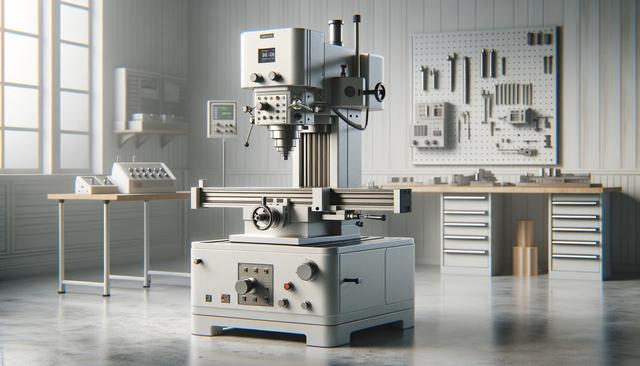Understanding the Role of Benchtop Milling Machines in Metal Projects
Benchtop milling machines are compact, versatile tools designed to shape and cut metal with high accuracy. These machines are ideal for hobbyists, small workshops, and even professional environments where space is limited. A benchtop milling machine provides the ability to work on detailed parts, prototypes, or repair pieces without the need for a large industrial setup.
They function by using rotary cutters to remove material from a workpiece, typically mounted on a movable table. Thanks to their precise control and smaller footprint, they are often used for tasks like engraving, slotting, drilling, and face milling. Whether you’re working with aluminum, steel, brass, or other metals, a benchtop machine can offer the control needed for quality results.
Key benefits of benchtop milling machines include:
- Space-saving design suitable for home or small workshops
- Ease of use for beginners and experienced users alike
- Relatively lower cost compared to full-size machines
Choosing the right model depends on your specific project requirements, such as the type of metal, size of the workpiece, and desired precision.
Key Features to Look for When Selecting a Machine
When selecting a benchtop milling machine for metal projects, there are several essential features to consider. These factors will directly impact the machine’s performance and your overall experience.
First, consider the motor power and spindle speed. A robust motor ensures the machine can handle harder metals without stalling. Variable speed control allows for greater flexibility depending on the task at hand. Second, look at the table size and travel distance. Larger tables with more travel allow for bigger pieces and more complex operations.
Other important features include:
- Digital readout (DRO) systems for precise measurements
- Sturdy construction, preferably cast iron for reduced vibration
- Adjustable depth stops and fine feed controls
Also, verify the compatibility with various cutting tools and attachments. Some machines support interchangeable heads or can be converted into CNC machines later, offering greater versatility.
Applications and Project Possibilities
Benchtop milling machines open up a wide range of possibilities for metalworking enthusiasts and professionals. Their precision makes them ideal for creating small parts, tools, and prototypes. Common applications include building brackets, engine parts, custom fasteners, or even artistic metal engravings.
In small-scale production environments, these machines can support short-run manufacturing or custom one-off pieces. For example, a machinist might use a benchtop mill to produce parts for vintage motorcycles, restore antique tools, or fabricate components for robotics projects.
Popular metal project ideas include:
- Custom knife handles and metal sheaths
- Precision gears and pulleys for mechanical systems
- Instrument components and enclosures
The machine’s versatility makes it a valuable asset for anyone working with metal, especially when high accuracy is required.
Maintenance and Safety Considerations
Maintaining your benchtop milling machine is vital for both safety and longevity. Regular maintenance ensures consistent performance and minimizes the risk of breakdowns. Basic upkeep includes cleaning metal shavings, lubricating moving parts, and inspecting belts and gears for wear.
Safety is equally important. Always wear protective gear such as safety glasses and gloves. Make sure the machine is properly grounded, and never operate it without securing the workpiece. Understanding and following the manufacturer’s guidelines can prevent accidents and prolong the equipment’s usability.
Additional safety tips include:
- Keep loose clothing and hair tied back
- Use guards and covers provided with the machine
- Turn off and unplug the machine during maintenance
Well-maintained machines not only last longer but also deliver more accurate and reliable results, especially when working with tougher metals.
Cost vs. Performance: Finding the Right Balance
Investing in a benchtop milling machine involves evaluating both performance and budget. While it’s tempting to go for the most affordable model, it’s essential to consider how well it meets your project needs. A lower-cost machine may lack features like digital readouts or fine adjustment controls, which could limit its usefulness for precision work.
On the other hand, high-end models may offer exceptional quality and durability but come at a higher price point. If you’re just starting out, a mid-range machine with essential features and room for upgrades could be a practical compromise.
To find a suitable balance, consider:
- How often you plan to use the machine
- The type of metals you’ll be working with
- Whether you need advanced features now or can add them later
By carefully assessing your goals and budget, you can choose a benchtop milling machine that supports your current needs while allowing for future growth.
Conclusion: Empowering Your Metal Projects with the Right Tool
For metalworking enthusiasts and small-scale fabricators, a benchtop milling machine offers a powerful combination of precision, convenience, and versatility. Whether you’re producing functional parts or detailed artistic pieces, the right machine can significantly enhance your capabilities. By considering factors like size, features, safety, and cost, you can make a well-informed choice that aligns with your project goals. With proper care and thoughtful use, a benchtop milling machine becomes a reliable partner in your creative and technical pursuits.






